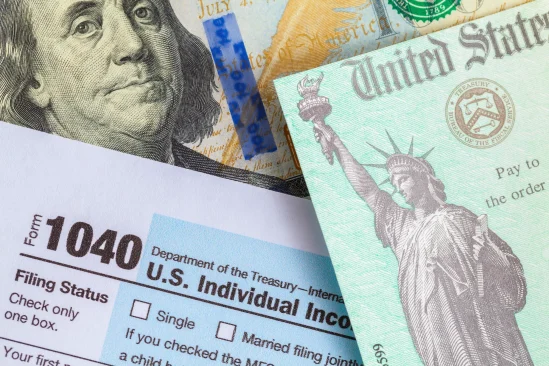
[ad_1]
More than 9 million Americans failed to collect the direct payments and should file before the October 17 deadline.
If you filed for a tax refund extension, you have days to claim the 2021 Recovery Rebate Credit, the Child Tax Credit, and the Earned Income Tax Credit.
The Internal Revenue Service announced in a statement that most people should file a form 1040 by the 17th to avoid a late penalty, but added that Free File will remain open through November 17.
The IRS said it will be sending out “special reminders” to people who appear to qualify for the credits but have not filed a 2021 tax return.
“The IRS wants to remind potentially eligible people, especially families, that they may qualify for these valuable tax credits,” IRS Commissioner Chuck Rettig said in the news release.
“We encourage people who haven’t filed a tax return yet for 2021 to review these options.
“Even if they aren’t required to file a tax return, they may still qualify for several important credits.”
Those eligible for the Child Tax Credit could get as much as $3,600 per child.
For parents who pay for daycare, there’s also an increased Child and Dependent Care Credit that could provide families without up to $4,000 per child and $8,000 for two or more.
The maximum stimulus payment, or Recovery Rebate Credit, is $1,400 for any qualifying adult, child, or adult dependent.
The Earned Income Tax Credit can be as much as $1,502 for low and moderate-income workers with no qualifying child, $3,618 for those with one child, $5,980 for those with two children, and $6,728 for those with at least three children.
If you are filing to claim a refund you’ll want to make sure that you file as quickly as possible.
Here are some common mistakes to make sure you avoid when filing so you get your return as soon as possible.
1. Incorrect bank account number
Those electing to receive their tax refund by direct deposit could receive their money within days.
But, if you put in the wrong account and/or routing number the Internal Revenue Service (IRS) will automatically send you a check in the mail instead.
That could take several weeks.
If you need your refund right away, it’s worth meticulously going through and ensuring this information is correct.
2. Math errors
Any error in the numbers presented could potentially misrepresent your income for the year.
It pays to double and triple-check each equation, no matter how minor it may seem.
Better yet, the IRS recommends filing electronically with a service that does this for you.
3. Incorrect filing status
Whether you’re filing jointly or as Head of Household may seem obvious, but you should confirm that your status accurately reflects your situation.
If you are unsure, the IRS offers this online tool to determine which box to check.
4. Unsigned forms
Forms without your signature will not count.
Couples filing jointly are especially prone to this mistake, not realizing that both spouses need to put down their signatures for their filing to be valid.
This is another situation where filing electronically gives you an advantage, as submissions cannot proceed without your e-signatures.
Other errors
Other common errors range from flubbed Social Security number submissions to mistaken tax credit requests.




